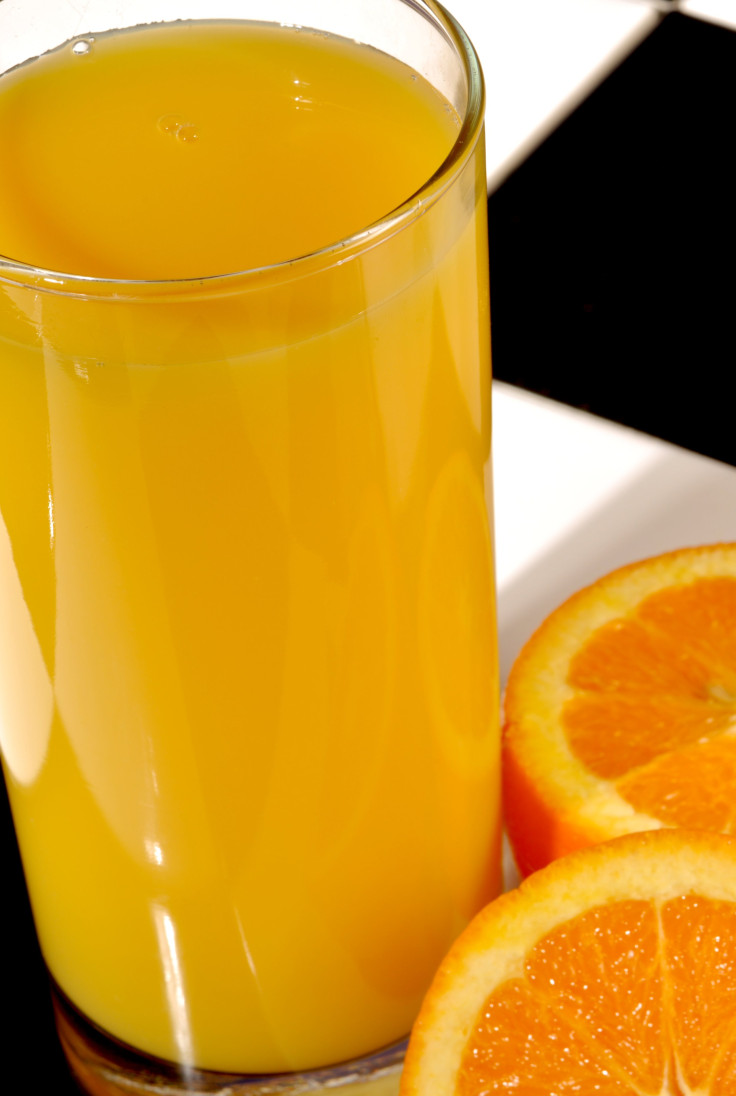Drinking Fruit Juice Ruins Diets: Food Facades To Avoid

Nutritionists at Tesco Diets have targeted a couple of the elusive weight-gain culprits of the summer. There are many foods we are consuming that are a lot less healthy than we think, especially when we see words like 'fruit.' Catherine Matthews, one of the nutritionists, says that fruit juice is actually the fastest way to gain weight.
"It takes less than a minute for most people to drink 150 calories," she said.
Fruit juice can be deceptively bad for you with its high sugar content and lack of fiber, causing sugars to be absorbed that much more quickly, which results in sugar highs and crashes paired with irritable, sluggish moods. Fruit itself has a natural protective layer of fiber that acts as a barrier for the intestine, which slows the absorption of sugar. This allows the liver to take the sugar at a steady rate. However, when consumed as juice or a smoothie, the fruit's fiber barrier is gone, which allows sugar to flow freely, ultimately overloading the liver.
This overload gives the body a burst of energy, which drops just as quickly as it spikes, also known as the 'sugar crash.' During this crash, the body sometimes starts experiencing hunger pangs, leading to more negative juice drinking outcomes.
Fruit sugar that is not burned off is converted into fat. Furthermore, a single serving of fruit juice contains the same amount of sugar as three-and-a-half doughnuts or 13 donut holes.
"You may think a fruit or veggie smoothie is packed with vitamins and minerals, but it is [like juice] also laden with sugar. Some contain as much sugar as fizzy drinks," Matthews said.
In order to quell the fruit juice urges, Tesco suggests replacing the juice for sugar-free squash or just dilute the juice with water if the sweetness is too tempting. Try eating actual whole fruit instead, in order to get the boost of fiber the body needs and slow down the sugar absorption.
Juice drinks are often confused with fruit juice, which contain only natural sugar. Juice drinks, on the other hand, contain added and artificial sugar, which makes the drink essentially just water and sugar.
"All of these beverages are largely the same. They are 100 percent sugar," Dr. David Ludwig, an expert on pediatric obesity at Children's Hospital Boston, said to CBS News. "Juice is only minimally better than soda."
There are other dangers lurking in juices too, such as cranberry juice's oxalate levels, which research found to have a direct link to kidney stones, though it was once thought to be a preventative measure.
Orange juice drinks do contain a sufficient amount of vitamin C; however, they are also corrosive to the teeth and feet. Due to the drink's high level of acidity, orange juice has a pH balance of 3.4, with 7 being the most acidic. Drinking orange juice on an empty stomach can aggravate any gastrointestinal conditions one may have. The regular consumption of orange juice can cause erosion to the enamel, the protective layer on teeth.
What's more, grape juice drinks tend to lower iron levels, making the body feel even more tired. Anemic people as well as those suffering from chronic fatigue syndrome, fibromyalgia, and polymyalgia rheumatica are advised to avoid drinking grape juice due to the high levels of sugar that deceitfully don't provide energy. The study revealed a single 250-milliliter serving of white grape juice contains just as much sugar as four Krispy Kreme glazed doughnuts.
"Sodas, sweet teas and fruit drinks can blow your calorie budget," said Dr.Christine Gerbstadt, M.D., R.D., author of Doctor's Detox Diet. "And artificially sweetened drinks can make your taste buds crave sugary things."
Nutritionists concluded that the best way to get healthy sweets are by eating whole fruits. The Tesco nutritionists also found some other facade diet foods, such as olive oil. Although olive oil has its benefits, one teaspoon alone contains 50 calories. Using olive oil spray, however, will cut the amount of calories by about 90 percent.
Brown bread should never be consumed without checking the ingredients first. Many companies will use dyes to make their breads appear healthier. Check the list to make sure the loaf is rich in fiber wholemeal or wholegrain.
Dried fruits, nuts, and granola also all seem like healthy and harmless snacks — that is, until you see the ingredients reveal high levels of sugar, salt, and fat. It's important to choose the unsalted nuts, and replace dried fruit with fresh fruit, and granola with branflakes.



























